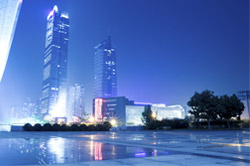Want to own a country?
Monday, April 23, 2012

For all intents, Honduras will let you.
Fred Blaser *
If you’re a billionaire, who doesn’t own a famous soccer team or the world’s most expensive art collection, now you can have your own country.
In most nations, no one can be leader, unless he or she was born there, or is at least a citizen.
Even in badly run countries, where people live poor and die young, and where they have nothing to lose by importing a leader from somewhere else, local rulers tend not to let this happen.
But as of this year, Honduras – incidentally, the murder capital of the world, and the second poorest country in Latin America – will let you build and operate a city, regardless of your national origin.
Each city would be in effect a small, private state, where you, as the owner, could have your own national bird, anthem, and flag.
More important, you could build a better world.
Some people say that this is like going back to the days, when the United Fruit Company practically ran Honduras, often underpaying and overworking banana pickers. But since you would not run the whole country, you would have to offer decent wages and working conditions, if you expect Hondurans to come to your project.
A bigger problem is that the plan needs work.
The model city concept was invented by Paul Romer, a professor at New York University.
In an article in Atlantic Monthly, Romer said that the idea is based on earlier examples of free towns, such as Lubeck, which under a 12th century charter from the German ruler of the time, prospered by being peaceful and efficient.
But Romer’s own website consists of a brief document, just four pages long, which doesn’t explain how you might set up a government, which makes rules on everything from salaries to sales tax, and from housing to homicide, or how your city could eventually evolve into a democratic state.
Then there is Honduras’ history of political instability, including a recent military coup, which ousted the then-president, who for his part was trying to be re elected, even though the constitution says that no one can be president twice.
A future Honduran regime might want to kick you out of your private town, maybe without compensation, even though you invested millions of dollars, and worked hard.
On the other hand, Honduras is a land of spacious ranches and fertile farms, where you could grow healthier crops, if you used less bug spray.
In a country with magnificent Mayan ruins, and stunning Caribbean beaches, you could own a resort town, which, thanks to good police protection and regular garbage collection, attracts visitors from all over the world.
A tech town could provide services not just locally, but also to the rest of the region.
Land prices are low in Honduras, as are the wages of most people, who as much as anything want a chance to work in a safe, productive environment.
No fewer than one in eight Hondurans has over the past decade run the risk of being kidnapped in Mexico, or dying of thirst in the Arizona desert, just so he or she can get a bad job in the United States, and be hunted as an illegal alien.
If good public relations help in getting deals done, investors should be lining up with their checkbooks.
In an article published last week, the New York Times said that a charter city could be the key to reforming a political and economic system, which keeps nearly two-thirds of its people in extreme poverty.
The Economist in a recent piece was even more enthusiastic: a model city on the shores of the Caribbean could be another Hong Kong, with “scores of skyscrapers and millions of people” surrounding a lush, tropical harbor.
In reality, any plan to build a Honduran utopia involves a huge risk, which is why few conventional investors will be interested in the idea.
But then, you’re a billionaire.
* Fred Blaser is the Publisher of Centralamericalink.com
Published in the Globe and Mail, May 24, 2012
